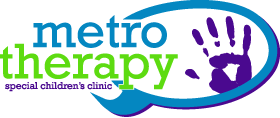Debunking Myths About Bilingual Language Development
We have a lot of kids that come to our clinic from bilingual families, and often we hear things from their parents that we have to debunk regarding the child’s ability to learn language. I’m Ellie, and I'm a speech language pathologist here at Metro Therapy. I'm here to talk to you about language development and some myths and facts about how children from bilingual households develop their language skills when they’re learning two languages.
Myth #1: Learning More Than One Language in Childhood Can Cause Language Delays
One myth that we hear a lot is that exposure to more than one language in childhood causes language delays. Research has shown time and time again that this is not true. A child might be more advanced in one language than the other, but in order for us to diagnose a language delay, we have to see deficits in both languages.
Myth #2: Learning More Than One Language Will Confuse Your Child
The second myth we hear often is that your child will get confused learning more than one language. This is false! A lot of times in bilingual language development, you will see a child switching back and forth between languages. This is a typical aspect of development and nothing to be concerned about. Children can actually learn to code switch, meaning they switch between languages and learn which language they should use based on their communication partner.
Myth #3: Children with Developmental Disabilities Can’t Learn a Second Language
Another myth we hear a lot is that children with developmental disabilities can't learn more than one language. This is also false! There has been research done on children with autism, Down syndrome, specific learning disability, and so on compared to children without developmental delays. There were no significant differences shown between children with developmental disabilities and children without them. We always find that it's best to assume that the child can learn and see what they can achieve.
Myth #4: A Child in a Bilingual Household Will Have Trouble in School
The last myth that we often hear is that your child will have difficulties in school if they're learning more than one language. But this is the complete opposite of the truth. Research has shown that children who learn more than one language actually have advanced problem-solving and multitasking skills, as well as good cognitive flexibility. In addition to this, there are resources in schools to support English language learners for academic success.
Call Metro Therapy for a Consultation
This was just a small overview, but if you have more questions or concerns about your child's language development, you can also reach out to us. Give Metro Therapy a call at (763) 333-9547 to schedule a consultation, and we’ll be happy to help.
